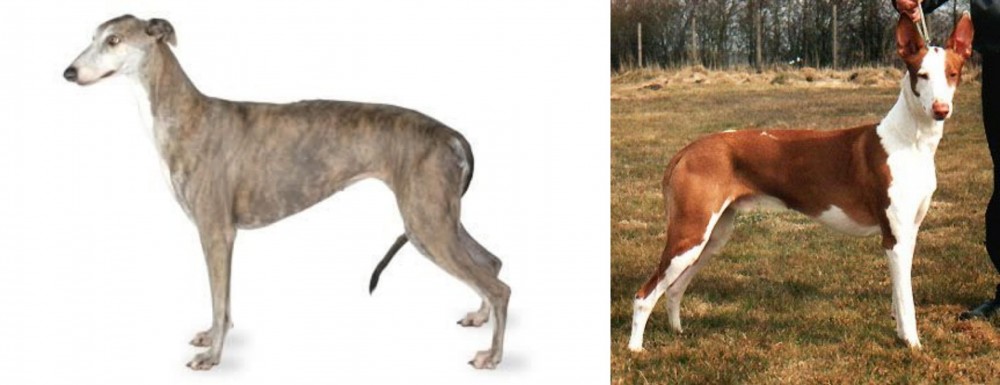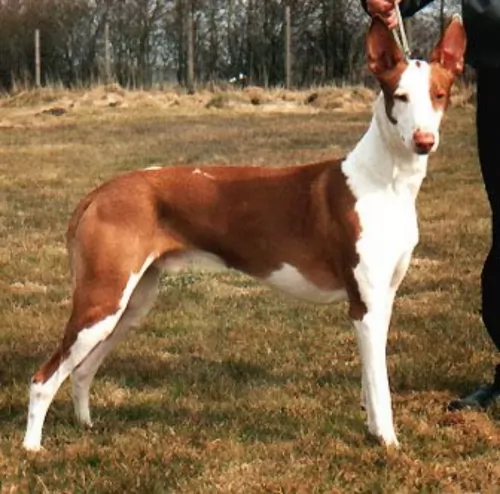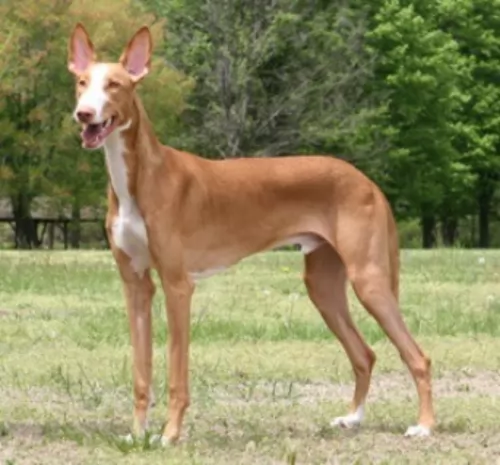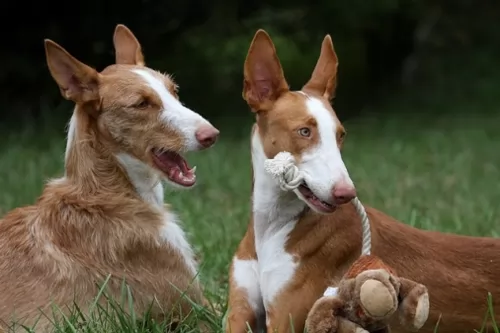 Petzlover
Petzlover Greyhound is originated from United Kingdom but Podenco Canario is originated from Spain. Greyhound may grow 12 cm / 5 inches higher than Podenco Canario. Greyhound may weigh 15 kg / 34 pounds more than Podenco Canario. Both Greyhound and Podenco Canario has almost same life span. Greyhound may have more litter size than Podenco Canario. Both Greyhound and Podenco Canario requires Low Maintenance.
Greyhound is originated from United Kingdom but Podenco Canario is originated from Spain. Greyhound may grow 12 cm / 5 inches higher than Podenco Canario. Greyhound may weigh 15 kg / 34 pounds more than Podenco Canario. Both Greyhound and Podenco Canario has almost same life span. Greyhound may have more litter size than Podenco Canario. Both Greyhound and Podenco Canario requires Low Maintenance.
 The Greyhound belongs to a group of dogs known as sighthounds. This is an ancient sighthound breed dating back a few thousands years.
The Greyhound belongs to a group of dogs known as sighthounds. This is an ancient sighthound breed dating back a few thousands years.
The dog has been bred for racing but today is also a popular pet. They’ve also been used for hunting too because of their keen eyesight and sense of smell.
In the United States there are Greyhounds registered with the American Kennel Club as well as those registered with the National Greyhound Association.
 The Podenco Canario comes from the Canary Islands (Spain) and is still used for hunting purposes to this day, although it is also becoming more of a companion dog.
The Podenco Canario comes from the Canary Islands (Spain) and is still used for hunting purposes to this day, although it is also becoming more of a companion dog.
It is believed that the dog descended from ancient dogs which were brought to the islands from Egypt and North Africa by early human settlers.
 The Greyhound is a tall, muscled, long-legged, slender dog with a flexible spine, a deep chest and exceptional eye sight.
The Greyhound is a tall, muscled, long-legged, slender dog with a flexible spine, a deep chest and exceptional eye sight.
The Males are usually about 71 to 76 cm in height with the females being slightly smaller. The dogs weigh in the region of 27 to 40 kg. The coat of the dog is short and smooth and is found in an assortment of colors, from fawn to white, tan, black and brindle.As far as grooming goes, he is looked upon as a low maintenance breed.
He has a long narrow muzzle, semi-erect/semi-floppy short ears and a long slender tail.
Sometimes referred to as being hypoallergenic, you need to allow your Greyhound indoors as the dog doesn't have an undercoat. He is therefore more susceptible to extreme temperatures. The face is long, narrow and pointed, the ears short and half-erect-half-floppy with a long, thin, whip-like tail.
Intelligent and gentle, the Greyhound is described by those who have owned them as wonderful pet. They are somewhat aloof around strangers but love their own human family. This is a non-aggressive, gentle, docile, calm dog. They are loving and get on well with their entire family, whether human beings or pets.
They’re sensitive dogs who appreciate quiet, calm environments. They may be quiet, but they are still social, loving the company of their family. They’re not great barkers and because they are non-aggressive, they don’t make wonderful guard dogs.
 The Podenco Canario is a medium sized dog and stands at between 55 and 64cm and weighs between 20 and 25kg. This is a slender, muscular dog but still robust and sturdy. There are in fact 2 sizes of Podenco Canarios – one is the medium sized dog of up to 64cm and the other is a smaller size.
The Podenco Canario is a medium sized dog and stands at between 55 and 64cm and weighs between 20 and 25kg. This is a slender, muscular dog but still robust and sturdy. There are in fact 2 sizes of Podenco Canarios – one is the medium sized dog of up to 64cm and the other is a smaller size.
The coat of the dog is short and smooth and is a rich red color or even chocolate brown. There are dogs which can have some white markings. The dog's nose and skin should be a shade of red and these dogs are known to blush when they become animated. The neck of the dog is long with the head being long and slender too, with the large bat-like ears being erect.
This dog can become very attached to his human family and is somewhat reserved around strangers. He is smart and will be able to learn easily. Training and socialization will be necessary to him as it makes him balanced and obedient.
He will appreciate a firm, consistent, kind owner as he is a dog that is strong willed and stubborn. He is a gentle dog too and can play well with children who have been taught to treat dogs with respect. He is active and will require a good deal of daily exercise.
 The Greyhound, forgetting about the racing part, makes a superb pet too. He won't do well in a household where there are screaming, noisy children and adults as he wants a quiet home to live in.
The Greyhound, forgetting about the racing part, makes a superb pet too. He won't do well in a household where there are screaming, noisy children and adults as he wants a quiet home to live in.
He can get on well with kind, gentle, respectful children as well as with pets in the home. Just like any dog, he will also need training and socialization as this can build up his confidence and then he knows how to please his owners and what they expect.
The Greyhound will require a gentle, fair, kind owner who understands his need for peace and quiet, and then he becomes a most wonderful devoted, loyal and loving pet.
 The Podenco Canario is a quiet breed that isn’t going to cause you trouble as he just slots into your way of life.
The Podenco Canario is a quiet breed that isn’t going to cause you trouble as he just slots into your way of life.
He is easy going, gentle and smart and wants to please. He is also a low maintenance dog, easy to please if he benefits from a good dose of exercise and human interaction.
Early socialization and training is important, as with any other dog breed, and then he becomes an excellent pet and friend of the family.
 Greyhounds are a wonderfully healthy dog breed and with good care can reach 14 years of age. They aren't prone to many genetic illnesses and unlike so many other dog breeds, this is one dog that doesn't battle with hip dysplasia – in fact it is almost unknown among this tall, slim dog breed.
Greyhounds are a wonderfully healthy dog breed and with good care can reach 14 years of age. They aren't prone to many genetic illnesses and unlike so many other dog breeds, this is one dog that doesn't battle with hip dysplasia – in fact it is almost unknown among this tall, slim dog breed.
The Greyhound does however, have a deep chest and this is what makes him vulnerable to bloat or gastric torsion. You have to take action quickly if you detect bloat – the stomach swells up – as this is a life-threatening condition that can occur quickly when air is trapped in the stomach. The stomach can become twisted.
Make sure your Greyhound doesn't gobble his food too quickly and preferably give him smaller meals as opposed to one or two large bowls of food.
 Your Podenco can live to be 10, 11 or 12 years of age if looked after well. Because he is a primitive breed, he is able to throw off some diseases that other dogs might battle with. Just like with other dogs however, he can battle with some health problems. One of two of the common dog illnesses to watch out for include -
Your Podenco can live to be 10, 11 or 12 years of age if looked after well. Because he is a primitive breed, he is able to throw off some diseases that other dogs might battle with. Just like with other dogs however, he can battle with some health problems. One of two of the common dog illnesses to watch out for include -
Skin problems can create havoc for your dog. They can be frustrating, painful and itchy. Skin problems can come from parasites, allergies and skin infections. Common parasites that involve the skin include ticks and fleas and mites. Dogs themselves can also cause irritation of the skin by licking one area over and over again from sheer boredom and stress.
To prevent this life threatening disease, try and feed your dog 2 meals a day instead of one so that he doesn't gobble his food up. This can contribute to bloat. The stomach fills with gas and the stomach can twist and bring death to the dog. Get your dog to the vet immediately if you see he is restless,drooling and has a swollen stomach.
This is particularly worrisome if you live in an area where there are lots of mosquitoes. Heartworm infections can be deadly for your dog. Speak to your vet about preventative treatment if you are traveling to an area known for its mosquito problems..
 Your Greyhound’s breeder will be the best guide for the type of- and the amount of dog food your hound will need. Of course, a growing puppy has different nutritional needs from a mature or senior Greyhound.
Your Greyhound’s breeder will be the best guide for the type of- and the amount of dog food your hound will need. Of course, a growing puppy has different nutritional needs from a mature or senior Greyhound.
Growing puppies and young dogs use a lot of energy so they will require a diet rich in protein. According to Greyhound experts, an adult Greyhound dog will need an average daily caloric intake of 1740 calories.
Older dogs and those that have been spayed or neutered will need less. Apart from the very best quality kibble, your Greyhound will most certainly require raw meat from time to time. You can also give him some cooked chicken, vegetables and brown rice. He should have access to a constant supply of fresh, cool water.
The Greyhound's coat is smooth and short and he sheds very little so he will only need a gentle brush-down once or twice a week.
Having a relaxed lifestyle is what your Greyhound will love. He is a dog that needs to spend time indoors. When outdoors, whether you live in the city or the country, he will need daily walks and a run in the park regularly.
Just because he is a sprinter, it isn't wise to take him with you with cycling or jogging as he is geared for a short burst of speed as opposed to a long run.
 Provide your dog with a daily dose of exercise. He will love to have a walk with you every day but ball games will also be important for him.
Provide your dog with a daily dose of exercise. He will love to have a walk with you every day but ball games will also be important for him.
Your Podenco Canario is a medium-breed dog, with a slim, muscular build To keep him that way, ensure he has a high quality commercially manufactured dog food that is high in the vitamins and minerals he needs.
Dry kibble needs to be enhanced with some home-made food. Boiled chicken, brown rice, sweet potatoes, carrots and spinach are excellent when chopped up and added occasionally to the dry kibble. You can also include some raw meat into his food from time to time. Such nutritious food which is simple, can help your dog live a long, healthy, happy life.
Your dog has a short coat and a brush twice a week will keep it in tip top condition. Make use of these brushing sessions to check your dog’s coat for fleas and ticks. Also check him over for any new lumps. Cancer is an ever present threat with dogs.
Look inside his ears for any signs of redness, and try and look inside his mouth too for signs of bad teeth. His nails should also be kept short and trimmed. If they get too long they can hook onto things and rip the flesh open.